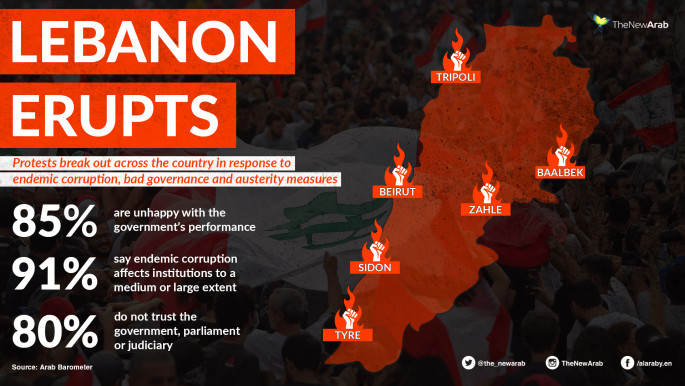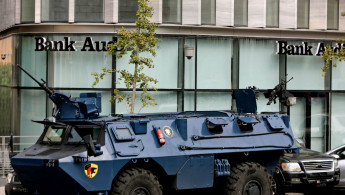Lebanon's banks reopen after two-week closure due to anti-corruption protests
The unprecedented popular push to remove a political class seen as corrupt, incompetent and sectarian, had kept the country on lockdown since 17 October.
Large queues starting forming outside banks from early morning and people rushed in as soon as doors opened to cash in their salaries and make transfers.
Read more: Hariri resigns, but the start of the revolution is not its end
Tellers struggled to handle the flood of customers trying to cram inside bank branches, as queues spilt onto the streets.
In the capital Beirut, a handful of activists briefly stormed the headquarters of the Association of Banks, before they were forced out by riot police.
There has been widespread concern that the reopening of the banks will be accompanied by a devaluation of the Lebanese pound but the central bank said the currency was still pegged to the greenback at 1,507 pounds to the dollar.
 |
|
| [Click to enlarge] |
In the parallel market however, the exchange rate is expected to be higher.
On Tuesday, Prime Minister Saad Hariri submitted his government's resignation in response to pressure from the street, despite warnings from some of his senior coalition partners against such a move.
President Michel Aoun on Thursday said ministers in the next government should be picked for their skills, not their political affiliation, appearing to endorse demonstrators' demands for a government of technocrats.
Aoun has asked Hariri's government to stay on in a caretaker capacity until a new one can be formed, but Lebanon has entered a phase of acute political uncertainty, even by its own dysfunctional standards.
With a power-sharing system organised along communal and sectarian lines, the allocation of ministerial posts can typically take months, a delay Lebanon's donors say the debt-saddled country can ill afford.
Growth in Lebanon has stalled in the face of the political deadlock of recent years, compounded by the 2011 breakout of civil war in neighbouring Syria.
It stood at around 0.2 percent in 2018, compared with more than 10 percent in 2009. It is expected to remain stagnant this year, according to the International Monetary Fund.
Economists are also deeply concerned by the country's crippling debt of $86 billion.
This equates to roughly 150 percent of gross domestic product, one of the highest rates in the world.
Eighty percent of that debt is owed to Lebanese commercial banks or the central bank.
Follow us on Twitter: @The_NewArab





 Follow the Middle East's top stories in English at The New Arab on Google News
Follow the Middle East's top stories in English at The New Arab on Google News
![The UAE is widely suspected of arming the RSF militia [Getty]](/sites/default/files/styles/image_330x185/public/2024-11/GettyImages-472529908.jpg?h=69f2b9d0&itok=Yauw3YTG)
![Netanyahu furiously denounced the ICC [Getty]](/sites/default/files/styles/image_330x185/public/2024-11/GettyImages-2169352575.jpg?h=199d8c1f&itok=-vRiruf5)
![Both Hamas and the Palestinian Authority welcomed the ICC arrest warrants [Getty]](/sites/default/files/styles/image_330x185/public/2024-11/GettyImages-2178351173.jpg?h=199d8c1f&itok=TV858iVg)